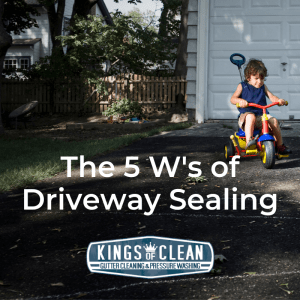
If you’re a new homeowner, you may wonder what the deal is with driveway sealing. You may have heard conflicting advice from home maintenance professionals about whether sealing your driveway is useful, and you might wonder if it’s really a worthwhile investment of your time and money, when there are likely other issues around your home you could be focusing on. To help answer some of your questions and give you the perspective you need to make an informed decision, we wanted to offer you some of the basic questions and answers you need to gain that understanding.
Who:
Who should be doing your driveway sealing? Many homeowners choose to seal their driveway themselves, and affordable kits are available, but it’s important to remember that if your sealing isn’t done properly, not only will you not protect your driveway, you may actually cause damage to your property. It’s also worth pointing out that driveway sealing can be an incredibly unpleasant job, particularly in the summer when it’s most commonly done. A professional service means you avoid the hassle and have the confidence that the job is done correctly.
What is driveway sealing?
Driveway sealing involves applying a protective coating to the concrete or asphalt to prevent cracking and discoloration. Concrete or asphalt driveways are made of porous materials which can absorb water. This means your driveway can become susceptible to erosion when water drains through an unsealed driveway and washes away the ground beneath it. During the winter, water that’s absorbed into your driveway can freeze, causing cracks and wider openings in the driveway material. Sealing your driveway fills in the porous surface of the driveway material with sealant, and ensures water drains off the driveway rather than being absorbed.
When should you seal your driveway?
Experts recommend sealing your driveway 90 days after installation and once the following year. From this point on, you can get away with resealing once every two to three years, depending on the amount of wear and tear your driveway is subjected to and the type of material your driveway is made of.
Where is driveway sealing important?
All concrete and asphalt driveways wear down over time, but those in moist, cold climates, such as here in the midwest, are more prone to weather-related deterioration. Sealing your driveway protects from all kinds of water damage, but freezing damage is by far the more impactful. Here in the Greater Cincinnati area where we can have heavy rains in the summer and extreme cold in the winter, getting your driveway sealed is particularly important to making it last.
Why seal your driveway?
Like everything else in your home, your driveway is an investment. Keeping your driveway in good repair helps you to enjoy your home more, keep your home’s resale value high, and protects other parts of your property. Sealing your driveway ensures your driveway lasts longer and looks better. It’s protecting your investment.
You can learn more about our driveway sealing service on our website or if you want to schedule a driveway cleaning and sealing service, you can contact us today!